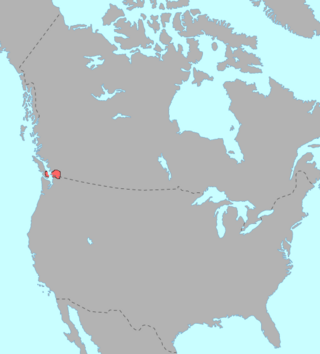 Global Information
Global InformationHalkomelem information
This article should specify the language of its non-English content, using {{lang}}, {{transliteration}} for transliterated languages, and {{IPA}} for phonetic transcriptions, with an appropriate ISO 639 code. Wikipedia's multilingual support templates may also be used - notably hur for Halkomelem. (May 2019) |
| Hul'qumi'num' | |
|---|---|
| Halq̓eméylem / Hul̓q̓umín̓um̓ / hən̓q̓əmin̓əm̓ | |
| Native to | Canada, United States |
| Region | Southwestern British Columbia into Northern Washington |
| Ethnicity | Salish peoples |
Native speakers | ca. 100[1] to 260 in Canada (2014)[2] 25 in US (1997)[2] |
Language family | Salishan
|
Writing system | NAPA |
| Language codes | |
| ISO 639-3 | hur |
| Glottolog | halk1245 |
| ELP | Halq'eméylem (Halkomelem) |
 | |
 Halkomelem is classified as Severely Endangered by the UNESCO Atlas of the World's Languages in Danger | |
Halkomelem (/ˌhɒlkəˈmeɪləm/;[3] Halq̓eméylem in the Upriver dialect, Hul̓q̓umín̓um̓ in the Island dialect, and hən̓q̓əmin̓əm̓ in the Downriver dialect)[4][5] is a language of various First Nations peoples of the British Columbia Coast. It is spoken in what is now British Columbia, ranging from southeastern Vancouver Island from the west shore of Saanich Inlet northward beyond Gabriola Island and Nanaimo to Nanoose Bay and including the Lower Mainland from the Fraser River Delta upriver to Harrison Lake and the lower boundary of the Fraser Canyon.
In the classification of Salishan languages, Halkomelem is a member of the Central Salish branch. There are four other branches of the family: Tsamosan, Interior Salish, Bella Coola, and Tillamook. Speakers of the Central and Tsamosan languages are often identified in ethnographic literature as "Coast Salish".
The word Halkomelem is an anglicization for the language Hul'qumi'num, which has three distinct dialect groups:
- Hulquminum / Hul'qumi'num (Island dialect) or "Cowichan" (spoken by separate but closely related First Nations on Vancouver Island and adjoining islands on the west side of the Strait of Georgia: the Snuneymuxw (Nanaimo), Snaw-naw-as (Nanoose) – the former "Saalequun tribe" is part of both First Nations, Stz'uminus (Chemainus), Cowichan Tribes, Lake Cowichan (Ts'uubaa-asatx), an originally Southern Wakashan-speaking people[6]), Halalt, Lyackson, Penelakut,[7] and Lamalchi.[8]
- Hunquminum (hǝn̓q̓ǝmin̓ǝm̓) (Downriver dialect) or "Musqueam" (spoken by seven First Nations in the Lower Mainland in and around Vancouver, as well as in the Fraser River Delta and the lower reaches of the Fraser River; which consider themselves linguistically and culturally related ethnicities – but do not identify as Stó:lō (although in the literature mostly attributed to these), but today often refer to themselves as "Musqueam", the Musqueam, Tsawwassen, Kwantlen, Tsleil-Waututh, New Westminster Indian Band, Kwikwetlem (Coquitlam), Katzie, and the now extinct Snokomish (Derby people).)
- Halqemeylem / Halq’eméylem (Upriver dialect) or "Stó:lō" (spoken by today 24 Sto:lo First Nations upstream along the Fraser River from Matsqui on to Yale; the historic "Ts'elxwéyeqw (Chilliwack)" (today's FN's Aitchelitz, Shxwhá:y Village, Skowkale, Soowahlie, Squiala, Tzeachten, and Yakweakwioose), "Pelóxwlh Mestiyexw (Pilalt/Pil’alt)" (today's FN's Cheam, Kwaw-kwaw-Apil, and Skwah), "Tiyt (Tait)" or "Upper Stó:lō" (today's FN's Popkum, Skawahlook, Chawathil, Seabird Island, Shxw'ow'hamel, Union Bar, Peters, and Yale), "Pepa:thxetel" or "Semà:th (Sumas)", and the "Sq’éwlets/Sqwōwich (Scowlitz)" (Sq'ewlets FN) tribes.[9]
The language differences (namely, in phonology and lexicon) are greatest between the Island and Upriver dialects, with the Downriver dialect (especially the Tsawwassen First Nation) providing a central link between the other two. The diversity of the Halkomelem dialects is noted to be the result of complex social and economic forces and linguistic change, as many Island people crossed the Georgia Strait to camp along the Fraser River (in both the Downriver and Upriver areas) for the summer runs of salmon. Arranged marriages between children in different language areas was also common, helping to establish a regional social network in the Strait of Georgia–Puget Sound Basin.
- ^ "Halkomelem Language and the Stó:lo/Cowichan Tribes (Halqomelem, Holkomelem, Kwantlen, Musqueam)". Native Languages of the Americas. Retrieved June 29, 2019.
- ^ a b Hul'qumi'num' at Ethnologue (21st ed., 2018)

- ^ Laurie Bauer, 2007, The Linguistics Student's Handbook, Edinburgh
- ^ "The Halkomelem Language". www.ydli.org.
- ^ "Musqueam's Story". Musqueam. Retrieved May 27, 2021.
- ^ the Ts'uubaa-asatx – usually known as "Lake Cowichan" and called by the Ditidaht c̓uubaʕsaʔtx̣ – are therefore often confused with the neighboring Cowichan Tribes (Quw'utsun Mustimuhw / Quw'utsun Hwulmuhw) – "People of the Warm Land", who speak a "Hul'qumi'num (Island)" dialect of Halkomelem (part of the Coast Salish languages), but regarding treaty negotiations with the government, the Ts'uubaa-asatx are still part of the "Hul'qumi'num Treaty Group". Currently, they are trying to revive their original culture and language with the support of the Nuu-chah-nulth and Ditidaht peoples.
- ^ Hul'quim'num Treaty Group
- ^ Granville Miller, Bruce (2007). Be of Good Mind, Essays on the Coast Salish. Vancouver, BC: UBC Press. p. 132. ISBN 978-0-7748-13242.
- ^ MacLachlan, Morag (1998). The Fort Langley Journals, 1827–30. Vancouver, BC: UBC Press. p. 168. ISBN 0-7748-0664-8.